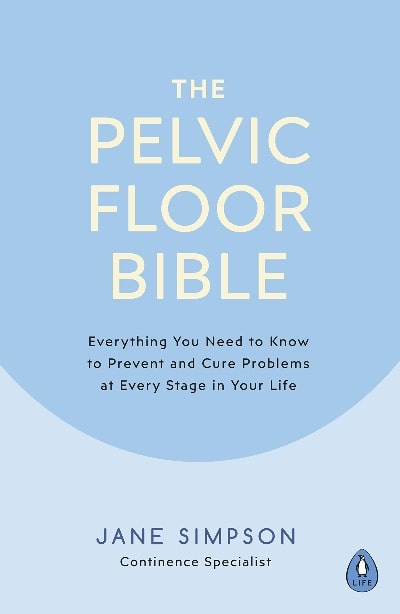Jane Simpson has been a private consultant for over twenty specialising in incontinence and pelvic floor dysfunctions. Her first book, The Pelvic Floor Bible: Everything You Need to Know to Prevent and Cure Problems at Every Stage in Your Life sheds a light on pelvic floor dysfunction, with the central message being: pelvic floor dysfunction is curable and does not need to be life-changing or limiting.
Can you tell us a little more about your journey into this space?
I have worked as a continence nurse specialist for the last 25 years. I started my nurse’s training in 1980 at Addenbrookes Hospital in Cambridge, going on to become a District Nursing Sister. I then specialised in bladder and bowel dysfunction as I thought there had to be a better quality of life for the patients I had been looking after as a District nurse. I have truly loved every minute of my long career!
What is the book about?

In my book, I have written chapters on:
Stress incontinence – Leaking when you cough, laugh or sneeze. The overactive bladder – This is a frequent or urgent need to get to the toilet and sometimes not making it (urge incontinence) Have you ever put the key in your front door and had the overwhelming urge to rush to the toilet? Is this ringing a bell?
Your Bowels – 50% of people with constipation have pelvic floor dysfunction.
Pelvic organ prolapse – A feeling of heaviness in the vagina, feeling like you are sitting on an egg, we know that 50% of women over 50 have a degree of prolapse (POP). Childbirth is one of the main reasons why women’s pelvic floors suffer.
Menopause – A lack of oestrogen in the vagina during and after the menopause can cause various pelvic floor problems.
Sex – Pelvic floor dysfunction can affect all sorts of things to do with our sexual lives and health
Men – all the things that can after the male pelvic floor.
Lastly, I have written at length about how to help yourself sort out your problems or at the very least have a ‘lightbulb moment’ and realise that you are not alone and are then empowered to seek help.
What motivated you to write your book?
I was motivated to write my book by a patient of mine, she kept telling me “you must write a book about this very important and hugely common problem!”. I then met my literary agent the wonderful Caroline Michel who is the CEO of Peters Fraser and Dunlop, she thought The Pelvic Floor Bible was a must and I was then lucky enough to have my book published by Penguin Life.
The pelvic floor, pelvic floor health, and pelvic floor dysfunction are still taboo but slowly starting to be talked about more and more with various books and articles now appearing in the mainstream press. I really hope that this starts to break down taboos which I think are just historical.
Why do you think the pelvic floor is a taboo?
I think that as our pelvic floor is neatly tucked away in our underwear where we can’t see it we try not to think about it too much until it is causing us problems.

Pelvic floor dysfunction in all its forms can seriously affect people’s quality of life, it affects both men and women. It can stop you from wanting to go out meet your friends and play sport to name a few things. I see patients who are terrified of finding themselves in the middle of the row in the cinema in case they need to go to the toilet urgently. This is such a curable problem, so if this is you reading this please seek help, so that when we are once again allowed to visit the theatre and cinema it will hold no fears for you.
I think that the biggest myth surrounding the pelvic floor is that we think or believe there is nothing you can do to make it better. Being told things like “well you have had a baby this is normal what can you expect” is so unhelpful. Most pelvic floor dysfunction can be cured or better managed and these outcomes can be totally life-changing.
We all need to learn more about our pelvic floor and how it works, we need to love our pelvic floor and it will love us back!
Do you think there is a gender disparity in this space?
PF dysfunction is a problem suffered by both men and women. It is clearly experienced more by women than men largely due to childbirth and menopause. There is therefore much more research about PF dysfunction related to women. Where it is required there is good research into the male pelvic floor. The good news is that organisations like The International Continence Society (of which I am a member) are constantly publishing the latest cutting edge research and data from around the world.







